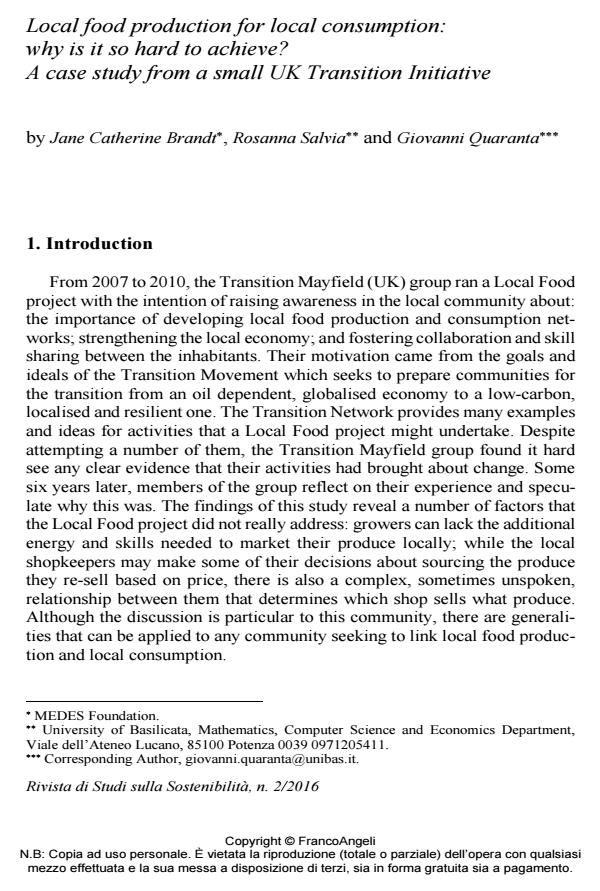Local food production for local consumption: why is it so hard to achieve? A case study from a small UK Transition Initiative
Titolo Rivista RIVISTA DI STUDI SULLA SOSTENIBILITA'
Autori/Curatori Jane Brandt, Rosanna Salvia, Giovanni Quaranta
Anno di pubblicazione 2017 Fascicolo 2016/2 Lingua Inglese
Numero pagine 11 P. 197-207 Dimensione file 148 KB
DOI 10.3280/RISS2016-002017
Il DOI è il codice a barre della proprietà intellettuale: per saperne di più
clicca qui
Qui sotto puoi vedere in anteprima la prima pagina di questo articolo.
Se questo articolo ti interessa, lo puoi acquistare (e scaricare in formato pdf) seguendo le facili indicazioni per acquistare il download credit. Acquista Download Credits per scaricare questo Articolo in formato PDF

FrancoAngeli è membro della Publishers International Linking Association, Inc (PILA)associazione indipendente e non profit per facilitare (attraverso i servizi tecnologici implementati da CrossRef.org) l’accesso degli studiosi ai contenuti digitali nelle pubblicazioni professionali e scientifiche
The Transition Mayfield (UK) group ran a Local Food project to raise awareness in the local community about the importance of developing local food production and consumption networks; strengthening the local economy and fostering collaboration and skill sharing. The discussion reveals number of factors that were not addressed: growers can lack the additional energy and skills needed to market their produce locally; the community already has very active social networks and the Transition group could not add anything to it; there is a complex relationship between shopkeepers that determines which shop sells what produce. The paper shows that, when trying to promote local food production for local consumption, attention has to be paid and an understanding gained of the motivation and constraints that operate in every part of the network.
Il gruppo Transition Mayfield (UK) ha realizzato un progetto finalizzato a sensibilizzare la comunità locale sull'importanza della produzione e del consumo di cibo locale; a rafforzare l’economia locale e a promuovere la collaborazione e la condivisione di abilità. Si evidenzia come una serie di fattori non siano stati affrontati adeguatamente: agli agricoltori possono mancare l’energia e le competenze supplementari necessarie per commercializzare i loro prodotti a livello locale; la comunità ha già molte attività sociali e il gruppo non riesce ad aggiungere nulla di alternativo; vi è una relazione complessa tra i diversi venditori che determina quale negozio vende ciò che producono. Il lavoro dimostra che nel perseguire la rilocalizzazione di produzione e consumo, l’attenzione deve essere rivolta alla comprensione delle motivazioni e dei vincoli che operano in ogni parte del network.
Keywords:Produzione di cibo locale, consumo di cibo locale, transizione, comunità, Regno Unito, rete
- Bailey I., Hopkins R., Wilson G. (2010). Some things old, some things new: The spatial representations and politics of change of the peak oil relocalisation movement. Geoforum, 41: 595-605.
- Donmoyer R. (2000). Generalizability and the single case study. In: Gomm R., Hammersley M., Foster P. (eds.). Case study method. Sage, pp. 45-68.
- Hatch J.A., Wisniewski R. (eds.) (1995). Life history and narrative, Washington, DC: Falmer Press.
- Haxeltine A., Seyfang G. (2009). Transitions for the People: Theory and Practice of ‘Transition’ and ‘Resilience’ in the UK’s Transition Movement. Tyndall Centre for Climate-Change research, Working Paper 134, July.
- Hopkins R. (2008). The transition handbook: from oil dependency to local resilience. Green Books, Totnes, 240 pp.
- Maye D. (2016). Examining innovation for sustainability from the bottom up: An analysis of the permaculture community in England. Sociologia Ruralis.
- Mayfield & Five Ashes Parish Council (2008). Parish council strategy and plan 2006-2026, available at http://www.mayfieldfiveashes.org.uk/mayfieldfiveashes/key-documents, (accessed 19 October 2016).
- Morris C., Buller H. (2003). The local food section: a preliminary assessment of its form and impact in Gloucestershire. British Food Journal, 106, 8: 559-566.
- Murray A., Kline C. (2015). Rural tourism and the craft beer experience: factors influencing brand loyalty in rural North Carolina, USA. Journal of Sustainable Tourism, 23, 8-9: 1198-1216. DOI: 10.1080/09669582.2014.987146
- Natural England (2013). National character area profile 122: High Weald, --available at http://publications.naturalengland.org.uk/publication/4706903212949504 (accessed 19 October 2016).
- Pinkerton T., Hopkins R. (2009). Local Food: how to make it happen in your community. Transition Books, 216 pp.
- Polkinghorne Donald E. (1995). Narrative configuration in qualitative analysis. International Journal of Qualitative Studies in Education, 8, 1.
- Quilley S. (2011). Resilience Through Relocalization: Ecocultures of Transition? Transition to a post-carbon, post-consumer society: new, traditional and alternative ways of living in the ‘adjacent possible, Ecocultures Working Paper, 2012-1, University of Essex, UK, --available at http://www.ecocultures.org/2012/02/resilience-through-relocalisation-ecocultures-oftransition/, accessed October 15, 2016.
- Schnell S.M. (2013). Deliberate identities: Becoming local in America in a global age. Journal of Cultural Geography, 30, 1: 55-89.
- Shortridge J.R. (1996). Keeping tabs on Kansas: Reflections on regionally based field study. Journal of Cultural Geography, 16, 1: 5-16.
- Sidali K.L., Kastenholz E., Bianchi R. (2015), Food tourism, niche markets and products in rural tourism: combining the intimacy model and the experience economy as a rural development strategy. Journal of Sustainable Tourism, 23, 8-9: 1179-1197.
- Transition Mayfield (2007). Local Food producers, suppliers and restaurants, available at http://www.transitionmayfield.org.uk/4.html (accessed 19 October 2016).
- Transition Network (2013). Official initiatives by number, --available at https://transitionnetwork.org/initiatives/by-number (accessed 19 October 2016).
- Wilson G.A. (2014). Community resilience: path dependency, lock-in effects and transitional ruptures. Journal of Environmental Planning and Management, 57, 1: 1-26. DOI: 10.1080/09640568.2012.741519
Jane Brandt, Rosanna Salvia, Giovanni Quaranta, Local food production for local consumption: why is it so hard to achieve? A case study from a small UK Transition Initiative in "RIVISTA DI STUDI SULLA SOSTENIBILITA'" 2/2016, pp 197-207, DOI: 10.3280/RISS2016-002017